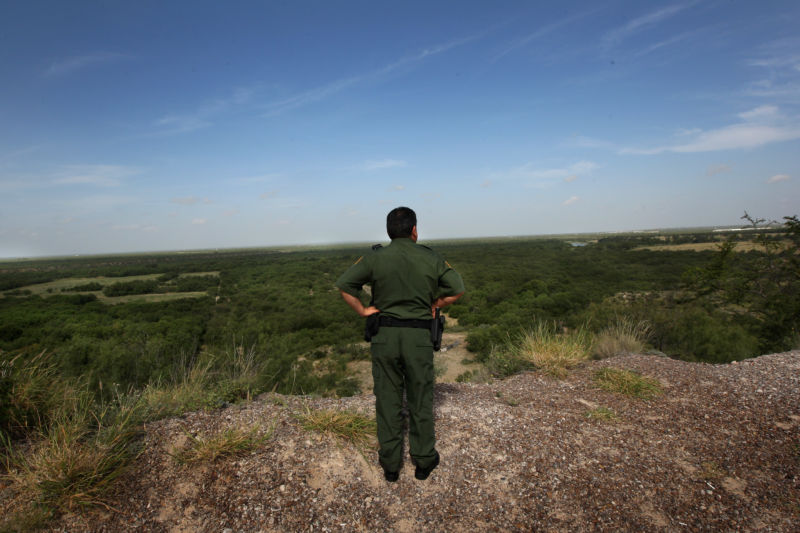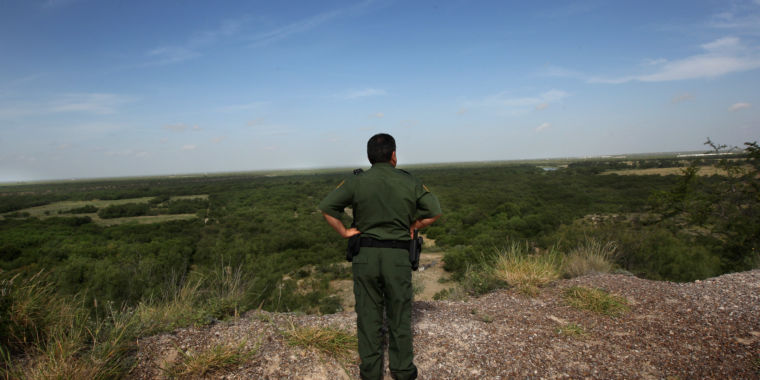
/ U.S. Border Patrol supervisor Eugenio Rodriguez surveys the Rio Grande River and surrounding environs August 7, 2008 in Laredo, Texas.
Closing November, a 74-year-outdated rancher and attorney became walking around his ranch factual south of Encinal, Texas, when he came about upon a dinky transportable digital camera strapped approximately eight feet excessive onto a mesquite tree approach his son’s home. The digital camera became encased in green plastic and had a transmitting antenna.
No longer figuring out what it became or the draw in which it bought there, Ricardo Palacios removed it.
Presently after, Palacios obtained phone calls from Customs and Border Security officers and the Texas Rangers. Every company claimed the digital camera as their very hold and demanded that or no longer or no longer it’s returned. Palacios refused, and so that they threatened him with arrest.
Palacios, who had flee-ins with local CBP agents going aid several years, took the digital camera because the closing straw. He became drained of agents routinely trespassing on his land, and even after complaining several times, he became aggravated that his grievances weren’t being heard.
As a that you simply would furthermore assume technique to ward off the specter of arrest, he sued the two agencies, along with a named CPB agent, Mario Martinez. Palacios accused them of trespass and of violating his constitutional rights.
« My client is 74 years outdated, he’s a attorney, been practising for almost 50 years, he has no criminal history whatsoever, guidelines-abiding citizen, revered attorney and senior citizen, » Raul Casso, one in every of the attorneys representing Palacios, told Ars. « To have assign him in jail would were—disregard the indecency of it—what a technique to whole a profession. »
The digital camera now stays in Palacios’ attorneys’ possession while they’re making an try to question the case’s judge to enable them to formally introduce it as evidence.
This federal lawsuit has raised thorny questions about the limits of the govt.’s vitality to conduct surveillance—in the title of border safety—on personal property, with out the landowner’s permission.
« As a subject of protection, CBP would no longer observation on pending litigation, » Jennifer Gabris, a CBP spokeswoman, emailed Ars.
The Texas Department of Public Security equally declined observation.
In court docket filings, Texas officers have claimed marvelous immunity, a correct doctrine that protects guidelines enforcement officers.
The border isn’t where you concentrate on it’s
Palacios’ ranch is found at the 35-mile marker due north from Laredo, along Interstate 35, factual three miles south of the dinky city of Encinal. The nearest US-Mexico border crossing is at Laredo.
The particular distance between the border and Palacios’ ranch issues: beneath federal guidelines, agents can whisk onto personal property that is internal 25 miles of the border « for the rationale of patrolling the border to discontinuance the illegal entry of aliens into the United States. »
In other words, if Palacios’ ranch were internal that vary, he most likely build no longer desire a case.
This is said to, nonetheless distinct from, the a hundred-mile radius that the CBP claims it’ll characteristic in and warrantlessly discontinuance other folk and search bags, vehicles, digital gadgets, and more. This is progressively known as a the « border exception » to the Fourth Modification, which protects against warrantless searches and seizures. (There is currently a lawsuit over border searches of digital gadgets underway in federal court docket in Massachusetts: Alasaad v. Duke.)
As Palacios alleges in the civil complaint, his interactions with CBP started in April 2010 when his two sons were stopped at a checkpoint along I-35. When one son, Ricardo Palacios Jr., refused to acknowledge to questions, he became taken to a secondary inspection where he became assaulted by a CBP officer. At closing, after being detained for 90 minutes, he became pushed home to the ranch factual a pair of miles away.
Over the subsequent several years, CBP agents roamed « freely about, day or night time » on the Palacios ranch, despite his a big selection of efforts to inform. He even despatched a formal letter to a regional CBP supervisor on April 9, 2010. Alternatively, the letter doesn’t seem to have made any substantive incompatibility.
A cycle of CBP agents making incursions onto the ranch and Palacios telling them to recede persisted for years—that is, till he chanced on the digital camera.
« Plaintiffs take that there may perchance be something creepy and un-American about such clandestine, surreptitious, 1984-model habits on the section of Defendants—officers of the guidelines, » Palacios argues in the complaint.
Palacios and his attorneys take into consideration that the digital camera is section of « Operation Drawbridge, » an effort by the Texas Department of Public Security to make exercise of « low-fee, commercially off-the-shelf know-how that has been adapted to meet guidelines enforcement needs, » with « 1000’s of cameras situated along the border. »
The cameras, that are in constant exercise, 24 hours a day, ship indicators to the Border Patrol to boot to reveal and local authorities.
« At approximately $300 per digital camera, they provide a excessive-tech functionality at a low-tech fee, » the Texas DPS internet pages states.
The Texas DPS failed to straight away acknowledge to Ars’ question for observation.
Due to the the lawsuit, Casso acknowledged, his client has easiest had one interaction with CBP: agents went to his door and requested his permission to pursue a community of other folk they believed were on his ranch and were undocumented. He agreed.
« It looks, this lawsuit has rang their bell, » Casso acknowledged. « On the one hand, or no longer it’s real they’re conserving us, nonetheless alternatively, they’re violating the Constitution. Now we have reason to take into consideration that there are Four,000 cameras deployed in all places in the distance. Might perchance well perchance there be more? Perchance. »
Casso became lickety-split to underscore that he became no longer suggesting that property owners in all places in the border space whisk seeking to assemble the same cameras on their very hold land.
« That is their personal industry, no longer mine, » he acknowledged.
The judge in the case, Magistrate Mediate Guillermo R. Garcia, has no longer scheduled any hearings for now.
« Our lawsuit is that we desire a federal judge to inform the border patrol and the feds to no longer whisk on [Palacios’] property with out permission or seemingly trigger, » David Almaraz, Palacios’ other attorney, told Ars. « And at the same time as you all are going to take doing that, you’re going to have to pay for it. Or no longer it’s known as the correct to be left by myself. That is what the Fourth Modification is all about. »


Commentaires récents